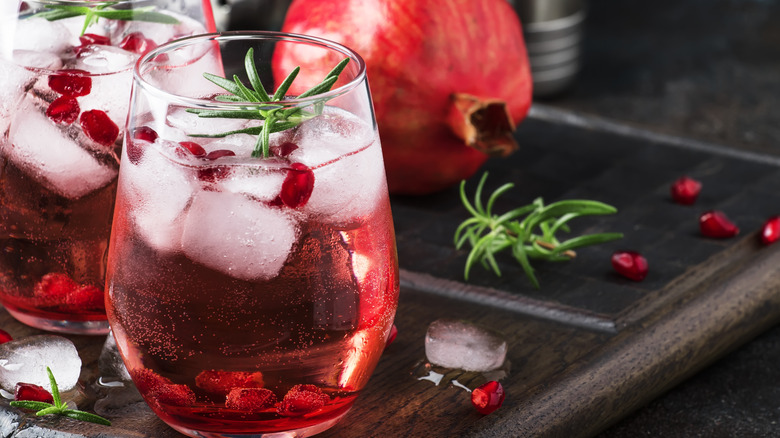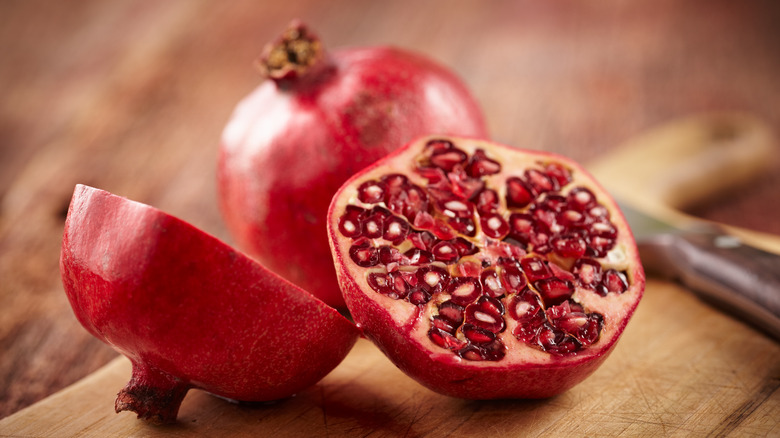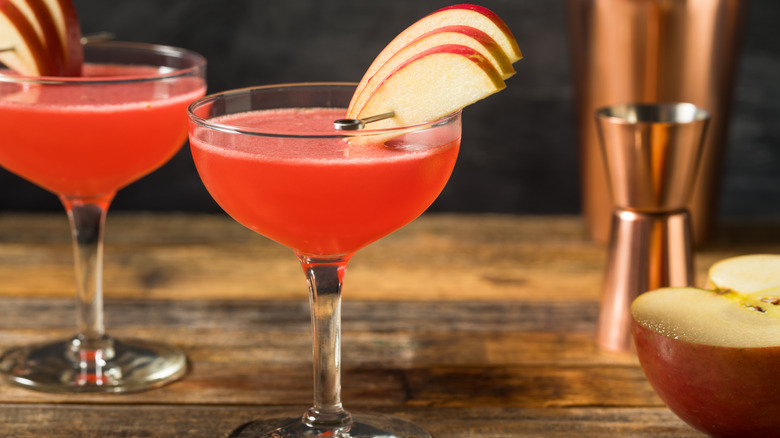The Little-Known Main Flavor Of Grenadine
Grenadine claims fame as a cocktail mixer ingredient, desirable for its distinct sweet and tart flavor and its ability to transform clear spirits like vodka and gin into sweet showcase concoctions. Though artificial versions of true grenadine syrups do exist, those aren't the ones you want in your grenadine cocktails like Pink Lady, Tequila Sunrise, Scofflaw, or Bacardi Cocktails. You'll be seeking out grenadine syrup made with its primary flavor ingredient: genuine pomegranate juice.
Though the pomegranate has a long and illustrious history in Europe and the Mediterranean, its first known recorded mention as a sugar-sweetened syrup came from French society. In an apothecary manual from 1769, a doctor lauded its value as a flavor enhancer for medicines. It wasn't long before the "syrup de grenade," using the French word for pomegranates, was being enjoyed for pleasure in cocktails and mocktails.
A true and traditional grenadine, as it adheres to its origin, contains a few simple ingredients: pomegranate juice, sugar, and sometimes lemon. Additions still acceptable by some grenadine aficionados include orange and rose flower waters or pomegranate molasses, which is simply a pure pomegranate juice reduction that's popular in Middle Eastern and other cuisines. But at its heart and liquid soul, grenadine is all about the pomegranate.
Purity matters in high-quality grenadine
The juice from real, tasty pomegranates is the undeniable and undisputed ideal for grenadine syrup. About 600 seeds per pomegranate rest within semi-transparent arils holding the prized juice. That's a lot of juicy seeds, but given that a whole pomegranate is only two and a half to five inches wide, it takes quite a few to provide even a single glass of pomegranate juice. So if you're making your own fresh grenadine at home, you might need a little help.
Given the seasonality of fresh pomegranates, you may miss out on expressing the juice yourself. However, it's still possible to get 100% pomegranate juice that's bottled and ready to go. Most of it is sold in concentrated form, requiring the addition of water to make it useable for homemade grenadine. Just make sure the concentrated liquid is pure unsweetened pomegranate juice with no added sugars. You'll sweeten the grenadine yourself by adding granulated or cane sugar, per preference.
Artificial sugars or other additives in pomegranate concentrates could alter the taste of an intended cocktail. But product descriptions may indicate some naturally occurring components such as punicalagin, which resides in pomegranate skins and is a proven beneficial antioxidant, according to a 2021 study by Nutrients.
Affordable yet artificial alternatives to pomegranates in grenadine
Using true pomegranate concentrations, if necessary, is a worthy timesaver –– but other substitutes border on blasphemy in the minds of grenadine purists. Some don't even contain pomegranate juice at all, opting instead for artificial flavorings and red food dye. And that sweetness in your drink can easily come from high-fructose corn syrup.
Ordering bar cocktails with pomegranate-based grenadine can be challenging, but the pure and tangy flavor depth in your glass is well worth going the extra step. Most bartenders don't mind questions, so go ahead and ask about the ingredients in the particular grenadine mix the establishment uses. Failing success, or finding disappointment in the answer, may send you back to your own home bar for making that authentic Jack Rose cocktail you've been craving.
In that case, premade grenadine mixes using real pomegranate juice are certainly available, with varying degrees of added ingredients. They may also cost a bit more. Just read the ingredients, don't be hesitant to whip out your smartphone and look up unfamiliar additives, and always choose ones with actual pomegranate juice. Even the little ones in your life can join the fun with a classic Shirley Temple –– made with, of course, genuine original-style grenadine.



